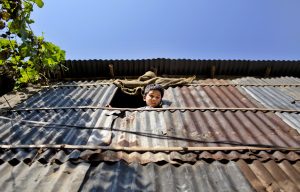Maliha (name changed to protect identity) is one of 18,500 female sex workers receiving HIV prevention services managed by Save the Children in Bangladesh through partner organizations Light House, Sylhet Jubo Acadmy, and Nari Mukti Sangha, with 29 drop-in-centers in 12 districts. Since the COVID-19 outbreak, 16 centers have been closed down and the rest operate at reduced capacity, opening twice a week to provide essential services. Like Maliha, thousands of sex workers are without employment due to the lockdown to help contain the coronavirus in Bangladesh, resulting in great hardship and hunger. Below she recounts her current situation.
My son did not eat anything. This morning I borrowed some money to buy him two pieces of bread. Looking at the bread, my son was disappointed, but I had to tell him “now, only bread is possible, two days later you may not even get bread, so please eat now.”
I am living in a nightmare since last month, when the lockdown started, and it is only getting worse. I can’t go to the street to find clients and I can barely survive without money and food. The streets are empty and clients are nowhere to be seen. Today, I have nothing to feed my family.
I live in a very small room with my husband, my 12-year-old son, and my mother-in-law, in a slum in Dhaka, Bangladesh. The area is densely populated, and we live with the knowledge that we could be infected by the virus at any time. It’s hard to maintain social distance as we share a common kitchen and toilet with our neighbors.
My husband is a rickshaw puller but he is also out of work because all services are suspended. So we have no money at all. Yesterday morning, I ate rice at my friend’s house, because after feeding my family there was nothing left for me.
My parents live in a village outside Dhaka and I used to send them some money every month, but now I can’t. Earlier, my income was good and along with my husband’s we could manage the family’s daily needs. The other day my parents called me asking for some money, but I can’t do anything for them. I am struggling to survive myself, how can I take care of them now?
I used to go to a sexual health clinic run by Light House (a Save the Children partner) for regular check-ups and to ensure I can remain safe from HIV. Last time I went there was just before the lockdown, and they advised me to stay at home to avoid contracting the coronavirus. They said that if I go out, I should wear a mask, wash my hands with soap, and that I shouldn’t put my hands near my mouth, eyes, and nose. Spitting, coughing, or sneezing should be avoided.
If I need condoms, I can usually collect some by calling an outreach worker, though the facility is closed. But what shall I do with the condom? There is no work.
If this situation continues for a long period, I don’t think I can survive. The virus has made my job impossible by limiting all physical contact to avoid the risk of transmission.
More than the virus, I am afraid of starving to death. None of us have had fish or meat in a month. How long can we survive like this? No money, no food. We are quarantined to starvation. Can we be taken from here and sheltered in isolation? I don’t know what will kill us — will it be the coronavirus or will it be hunger?
Save the Children is aiming to provide financial support to sex workers struggling to make ends meet. To support Save the Children’s global COVID-19 emergency appeal, click here.
































